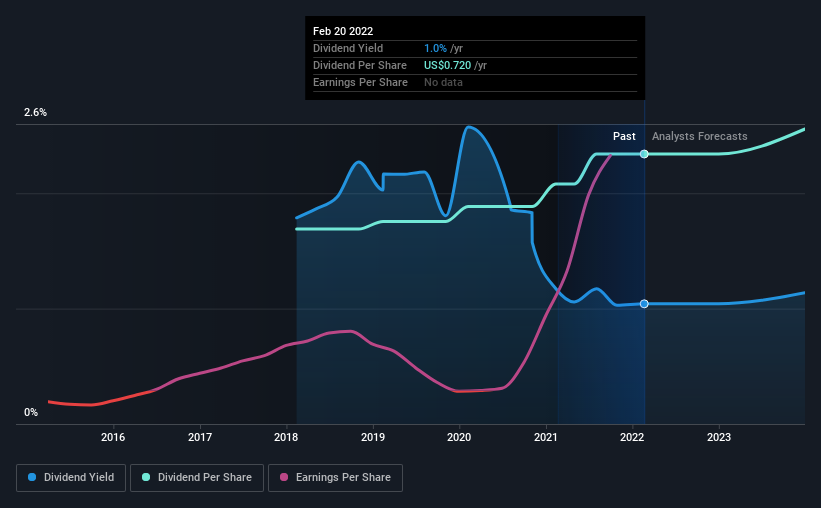Here's What We Like About Louisiana-Pacific's (NYSE:LPX) Upcoming Dividend
Louisiana-Pacific Corporation (NYSE:LPX) is about to trade ex-dividend in the next 3 days. The ex-dividend date is one business day before a company's record date, which is the date on which the company determines which shareholders are entitled to receive a dividend. The ex-dividend date is of consequence because whenever a stock is bought or sold, the trade takes at least two business day to settle. Thus, you can purchase Louisiana-Pacific's shares before the 25th of February in order to receive the dividend, which the company will pay on the 14th of March.
The company's next dividend payment will be US$0.22 per share, on the back of last year when the company paid a total of US$0.72 to shareholders. Based on the last year's worth of payments, Louisiana-Pacific has a trailing yield of 1.0% on the current stock price of $69.13. We love seeing companies pay a dividend, but it's also important to be sure that laying the golden eggs isn't going to kill our golden goose! So we need to check whether the dividend payments are covered, and if earnings are growing.
View our latest analysis for Louisiana-Pacific
Dividends are typically paid from company earnings. If a company pays more in dividends than it earned in profit, then the dividend could be unsustainable. Louisiana-Pacific has a low and conservative payout ratio of just 4.6% of its income after tax. A useful secondary check can be to evaluate whether Louisiana-Pacific generated enough free cash flow to afford its dividend. What's good is that dividends were well covered by free cash flow, with the company paying out 4.6% of its cash flow last year.
It's positive to see that Louisiana-Pacific's dividend is covered by both profits and cash flow, since this is generally a sign that the dividend is sustainable, and a lower payout ratio usually suggests a greater margin of safety before the dividend gets cut.
Click here to see the company's payout ratio, plus analyst estimates of its future dividends.
Have Earnings And Dividends Been Growing?
Companies with consistently growing earnings per share generally make the best dividend stocks, as they usually find it easier to grow dividends per share. If business enters a downturn and the dividend is cut, the company could see its value fall precipitously. It's encouraging to see Louisiana-Pacific has grown its earnings rapidly, up 41% a year for the past five years. Louisiana-Pacific earnings per share have been sprinting ahead like the Road Runner at a track and field day; scarcely stopping even for a cheeky "beep-beep". We also like that it is reinvesting most of its profits in its business.'
The main way most investors will assess a company's dividend prospects is by checking the historical rate of dividend growth. Since the start of our data, four years ago, Louisiana-Pacific has lifted its dividend by approximately 8.5% a year on average. It's encouraging to see the company lifting dividends while earnings are growing, suggesting at least some corporate interest in rewarding shareholders.
The Bottom Line
From a dividend perspective, should investors buy or avoid Louisiana-Pacific? Louisiana-Pacific has been growing earnings at a rapid rate, and has a conservatively low payout ratio, implying that it is reinvesting heavily in its business; a sterling combination. There's a lot to like about Louisiana-Pacific, and we would prioritise taking a closer look at it.
In light of that, while Louisiana-Pacific has an appealing dividend, it's worth knowing the risks involved with this stock. To help with this, we've discovered 1 warning sign for Louisiana-Pacific that you should be aware of before investing in their shares.
If you're in the market for strong dividend payers, we recommend checking our selection of top dividend stocks.
Have feedback on this article? Concerned about the content? Get in touch with us directly. Alternatively, email editorial-team (at) simplywallst.com.
This article by Simply Wall St is general in nature. We provide commentary based on historical data and analyst forecasts only using an unbiased methodology and our articles are not intended to be financial advice. It does not constitute a recommendation to buy or sell any stock, and does not take account of your objectives, or your financial situation. We aim to bring you long-term focused analysis driven by fundamental data. Note that our analysis may not factor in the latest price-sensitive company announcements or qualitative material. Simply Wall St has no position in any stocks mentioned.

